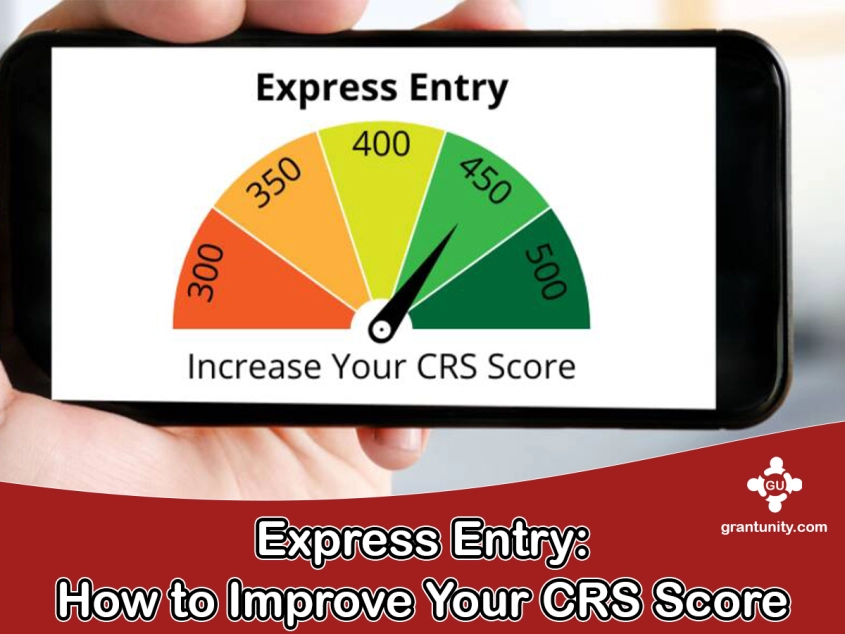Express Entry: How to Improve Your CRS Score + 5 Tips
The Comprehensive Ranking System (CRS) score is a crucial component of Canada’s Express Entry system, which manages the immigration applications of skilled workers who wish to become permanent residents of Canada. The CRS score is used to rank and select candidates from the Express Entry pool based on their qualifications, skills, and other factors. The CRS score is a points-based system that evaluates candidates on various criteria, including age, education, work experience, language proficiency, and adaptability factors. The higher a candidate’s CRS score, the more likely they are to receive an Invitation to Apply (ITA) for permanent residency in Canada.
The CRS score is calculated using a specific formula that allocates points for each criterion. For instance, points are awarded based on factors such as the candidate’s age, level of education, proficiency in English or French, work experience, and whether they have a valid job offer or provincial nomination. Additional points can be obtained through adaptability factors, such as having a Canadian educational credential or a sibling living in Canada. The CRS score is crucial in the Express Entry system because it determines a candidate’s ranking within the pool of applicants. The Government of Canada periodically conducts draws from the pool and invites candidates with the highest CRS scores to apply for permanent residency. Those who receive an ITA can proceed with their application and have a chance to become permanent residents of Canada.

The minimum CRS score required for an ITA can vary from one draw to another, as it depends on the number of available spots and the competitiveness of the pool. Generally, candidates with higher CRS scores have better chances of receiving an ITA, while those with lower scores may need to enhance their profiles to increase their competitiveness. It’s important to note that the CRS score is not a permanent or fixed value. It can change over time as candidates update their profiles with new information or improve their qualifications. By enhancing their CRS scores through factors like gaining more work experience, improving language proficiency, or obtaining a provincial nomination, candidates can increase their chances of receiving an ITA.
The CRS score plays a significant role in the Express Entry system as it helps the Canadian government select highly skilled individuals who are likely to succeed and contribute to the country’s economy. It prioritizes candidates who have the highest potential to integrate into the Canadian labor market and society.
Perfect your Profile
It’s crucial that you give a truthful account of yourself in your Express Entry profile. There are severe consequences for misrepresenting yourself in addition to the potential for additional Comprehensive Ranking System (CRS) points.
The first thing to keep in mind is that the qualifications needed to join the Express Entry pool may not be the same as those that will increase your CRS score.
1. Language Skills
When combined with other factors (such as post-secondary education), language is one example of a valuable factor within the CRS and can be worth up to 310 CRS points. If the candidate is married or living with a common-law partner, this number can increase even more, to 320.
Your score can usually be raised in the area of language. This is so that you can receive credit if your language skills are above the required level. The Federal Skilled Worker Program, for instance, only requires CLB 7 (all abilities), but it is possible to earn more points by incrementally raising each ability’s score, up to CLB 10. Language is also valuable because it counts for points in several sections of the CRS:
- Within the human capital factors.
- Within the spousal factors (if one is married or in a common-law partnership)
- Within the skill-transferability “combinations”
- Within the additional factors.
The following table demonstrates how language plus a second factor, in this case, education, can add up to 50 points.
| Educational Level | CRS points earned |
| Secondary school | 0 |
| Post-secondary program credential of one or more years + first language CLB 7 or more in all abilities (at least one ability needs to be less than CLB 9) | 13 |
| Post-secondary program credential of one or more years + first language CLB 9 or more in all abilities | 25 |
| Two or more post-secondary program credentials (one at least 3 years) + CLB 7 or more in all abilities for first language (at least one ability needs to be less than CLB 9) | 25 |
| Two or more post-secondary program credentials (one at least 3 years) + CLB 9 or more in all abilities for first language | 50 |
To earn the maximum 50 points, candidates must have a CLB of 9 or higher in each of the four language skills—reading, speaking, writing, and listening.
You might not receive all 50 points if you have even one ability with a CLB rating below 9. In contrast, you might gain many points by honing a single ability.
Example:
Eric is 29, has a Master’s degree, three years of skilled foreign work experience and an IELTS score of 7 in each language ability. As is, Eric’s credentials translate to a CRS score of 405.
If Eric redid the IELTS test and improved his listening ability by one point, from 7 to 8, Eric’s CRS score would jump to 469.
By improving his listening score, Eric would gain 25 points in two skill-transferability combinations, for a total of 50 points, and also increase his human capital language score by 14 points.
2. Education
If the education was completed entirely outside of Canada, it can be worth up to 200 CRS points; if it was completed in Canada, it can be worth up to 250 points. By earning additional credentials, such as another degree or more Educational Credential Assessments (ECAs) for previously earned degrees, you can raise your initial education score.
To earn CRS points for education completed outside of Canada, an ECA is necessary. Candidates for the Federal Skilled Worker Class who received their education outside of Canada are only required to submit one ECA in order to be considered for the pool.
There is no ECA necessary for applicants to the Federal Skilled Trades Class or the Canadian Experience Class to join the Express Entry pool.
Example:
Johanna is 35 years old, married, has two foreign bachelor’s degrees, three years of work experience, advanced English language proficiency, and a spouse with advanced English and one bachelor’s degree.
Johanna has only one ECA for one of her degrees, which was sufficient to enter the Express Entry pool immediately, and her spouse has never obtained an ECA.
Johanna enters the Express Entry pool with points for one degree and a CRS score of 405.
If Johanna obtains an ECA for her spouse’s bachelor’s degree, her score improves to 413. If, in addition, she has her second bachelor’s degree assessed, her score improves to 445.
3. Spouse or Common-law Partner Might be a Better Principal Applicant
Compare your CRS scores as principal applicants with those of your spouse or common-law partner if you have one. A main applicant’s CRS score may occasionally be lower than their accompanying partner’s. In these situations, it might be best for a spouse or common-law partner to submit the application on their behalf. Here’s an instance where a spouse or common-law partner might be a better principal applicant.
Example:
George and Susan both have bachelor’s degrees and speak English well. Susan, who most recently held a position as a teacher from 2009 to 2012, has much less work experience than George, who has been a financial analyst for the last ten years.
George might not be aware that the number of CRS points he and Susan can receive for their respective work histories is equal. The key distinction between them is that 29-year-old Susan receives significantly more points as a principal applicant than 39-year-old George due to her younger age.
Given her age, Susan’s score would rise from 393 to 443 if she applied as the main candidate instead of George.
4. Work Experience
A candidate’s CRS score may be raised by gaining more work experience or by better describing the experience they already have. Some candidates who appear to have unskilled job titles may actually have performed tasks that fall under Canada’s National Occupation Classification, or NOC.It is possible to determine whether your work is considered skilled or unskilled by looking beyond the job title and comparing the tasks you completed to those listed in the various occupations in the NOC. Additionally, you may receive points that you would not have otherwise.
Calculating how much time you spent at each job comes after choosing the best NOC for your work experience. For full-time work experience or comparable part-time work, points are given.
Candidates for the Federal Skilled Worker Class must have at least one year of continuous, skilled work experience to be considered. To earn CRS points, however, even intermittent work history is acceptable.
Example:
35 years of age is Shiv. He has one year of full-time work experience as a software engineer under his belt since receiving his Master’s degree. He speaks advanced levels of English and has never worked or studied in Canada. Shiv worked as a software “salesman” for four years as a part-time employee before earning his master’s degree. Shiv only listed one year of work experience because that was the bare minimum required to be included in the Express Entry pool. He was not sure if his sales position qualified as a skilled occupation under the NOC or if working part-time would affect his CRS score. Shiv currently has a 423 CRS rating. Due to the full-time equivalent of his part-time work and the fact that technical sales (NOC 6221) is a skilled occupation, Shiv could have, however, claimed three years of work experience. Shiv could have a CRS score of 448 by claiming these two more years of experience in the field.
5. Job Offer
Depending on the position, candidates with a valid job offer could receive an extra 50 or 200 points on their CRS score. Candidates may receive an additional 50 points toward their CRS score if they have a legitimate job offer in a NOC 0, A, or B level occupation. A further 200 points under the CRS may be given to candidates who have a legitimate job offer in one of the Major Group 00 Senior Management Occupations.
According to the IRCC, a job offer must be in writing and include all pertinent information, such as pay and deductions, job responsibilities, and employment terms.
Work Experience and Provincial Nominee Programs
Your eligibility for a nomination by one of Canada’s Provincial Nominee Programs, or PNPs, can also be increased by accurately documenting your work experience. Candidates for Express Entry who are nominated by a Canadian province for permanent residency are given an extra 600 points toward their CRS score.
Provinces occasionally seek out applicants with particular work experience, which you may in fact possess but do not consider relevant because it is unrelated to your primary line of work.
Example:
Yasmine is 35 years old, holds a bachelor’s degree, speaks English fluently, and says she has worked as an IT manager for three years. Considering her qualifications, Yasmine has a CRS score of 408. However, Yasmine also acquired two years of programming experience in addition to her previously stated work experience. Yasmine chose not to disclose her programming experience because she was already receiving the maximum CRS points for international work experience and didn’t feel like requesting reference letters from a previous employer. Yasmine might have qualified for the province of Nova Scotia’s Express Entry Demand Stream if she had done so given her programming background. One of the occupations listed as an opportunity occupation by Nova Scotia, where job opportunities may exist, is programmer. Yasmine’s CRS score would have increased to 1,008 thanks to the 600 points she could have earned by securing a Nova Scotia nomination.
Proactively Prepare for an ITA or Provincial Nomination
No matter their CRS ranking, all candidates in the Express Entry pool ought to be actively preparing for an ITA or provincial nomination. A provincial nomination could suddenly raise your CRS score from 299 to 600, guaranteeing you an ITA in the upcoming Express Entry invitation round even if your current score is only 299.
Following the receipt of an ITA, candidates have just 60 days to submit their entire application; some PNPs give even less time. When you are invited, you can get started right away by having your documents ready in advance.
Express Entry Provincial Nominee Programs (PNPs)
Among these are several programs that:
- Do not consider a candidate’s CRS score among their eligibility requirements; and
- Are open to candidates with no ties to Canada (such as a relative, job offer, or previous Canadian work or study).
These PNPs can be valuable to Express Entry candidates and are therefore extremely popular.
Some operate on a first-come, first-served basis and reach their intake quotas within a day of opening, and proactive preparation is sometimes the only hope for applying successfully.
The Express Entry stream for Nova Scotia is a well-known illustration of a first-come, first-served PNP stream.
| Nova Scotia’s Demand: Express Entry | |
| Does it consider your CRS score? | NO |
| Is it open to specific occupations? | YES |
| What is the selection system? | Its own, unique, eligibility and points-system |
| Does Nova Scotia provide advance notice of when the next time the program opens up and you can submit your application? | 1 DAY |
| How long does it take for the intake threshold to reach its capacity? | LESS THAN A DAY |
The stream has a special points system, and a list of qualifying occupations, and does not take a candidate’s CRS score into account. The application-intake threshold is frequently reached just hours after opening in Nova Scotia, which gives little advance notice.
Given the short application period, many applicants get ready well in advance of the reopening of these streams. Planning involves some risk because PNP requirements and eligibility requirements are subject to sudden change.
Ontario Human Capital Priorities Stream
Ontario’s well-liked Human Capital Priorities Stream, which is linked to Express Entry, is another PNP that might reward proactive candidates. This stream utilizes a so-called passive model, which enables Ontario to search the Express Entry pool and choose applicants who have a CRS score of at least 400 and the precise skills necessary to meet the needs of the province’s labor force. However, it is noteworthy that Ontario once exempted IT professionals from the prerequisite of 400 CRS points.
It can be difficult to gather all the necessary documentation within the 45-day deadline for Express Entry candidates who receive an invitation through the Human Capital Priorities Stream to submit their applications.
Ontario has advised Express Entry applicants interested in the Human Capital Priorities Stream to make a new profile in the Express Entry system in addition to gathering documentation. When Ontario searches the Express Entry pool, doing so makes it simpler to find the candidates’ profiles.
Candidates who are interested in the Ontario Human Capital Priorities Stream should keep a close eye on new developments with the stream, as is the case with the Nova Scotia Express Entry stream previously mentioned, and take action to be proactive if or when an opportunity presents itself.
Frequently Asked Questions: How to Improve Your CRS Score
There are several strategies to improve your CRS score. Some effective methods include enhancing your language proficiency in English or French, gaining additional work experience, obtaining a higher level of education, securing a valid job offer, obtaining a provincial nomination, or improving your spouse’s credentials.
Improving your language proficiency can significantly impact your CRS score. Achieving higher language test scores, such as in the International English Language Testing System (IELTS) or the Test d’évaluation de français (TEF), can award you additional points in the CRS calculation.
Yes, obtaining additional education can positively impact your CRS score. Completing a higher level of education, such as a master’s degree or a Ph.D., can earn you more points in the CRS calculation.
Yes, work experience plays a crucial role in the CRS score. Gaining more years of work experience, particularly in skilled occupations, can significantly increase your CRS score. The more years of full-time work experience you have, the more points you can earn.
Yes, having a valid job offer from a Canadian employer can significantly boost your CRS score. A job offer that meets certain criteria can earn you additional points in the CRS calculation.
Obtaining a provincial nomination from a Canadian province or territory can provide a substantial CRS score boost. A provincial nomination can award you 600 additional CRS points, virtually guaranteeing you an Invitation to Apply (ITA) for permanent residency.
Yes, improving your spouse’s qualifications can positively impact your CRS score. Factors such as their language proficiency, education, and work experience can earn you additional points in the CRS calculation.
Yes, adaptability factors can contribute to your CRS score. For example, if you or your spouse has previously studied in Canada, obtaining a Canadian educational credential can earn you additional points. Additionally, having a sibling who is a Canadian citizen or permanent resident can also increase your CRS score.
Yes, you can update your Express Entry profile to reflect any changes or improvements that may positively affect your CRS score. If you enhance your qualifications, such as improving your language test results or gaining more work experience, it is recommended to update your profile accordingly.
The CRS scoring system and its criteria may change periodically. It is essential to stay updated by regularly checking the official Immigration, Refugees and Citizenship Canada (IRCC) website or consulting with an immigration professional to ensure you have the most current information.
Yes, completing a recognized Canadian post-secondary program can enhance your CRS score. Depending on the level of education achieved and the duration of the program, you can earn additional points in the CRS calculation.
If you don’t have a valid job offer, there are other strategies to improve your CRS score. Consider focusing on areas such as language proficiency, education, gaining more work experience, obtaining a provincial nomination, or enhancing your spouse’s qualifications.
Retaking language tests to improve your language proficiency can be beneficial if you believe you can achieve higher scores. Improving your language skills can earn you additional points in the CRS calculation and potentially boost your CRS score.
Generally, educational credentials obtained after submitting your Express Entry profile cannot be considered for CRS points in subsequent draws. However, it is advisable to update your profile with any significant changes or improvements to ensure accurate representation of your qualifications.
Improving your spouse’s language proficiency can contribute to an increased CRS score, but it may not be sufficient on its own. The CRS score considers various factors, and it’s advisable to focus on multiple areas, such as education, work experience, or obtaining a provincial nomination, for more substantial score improvements.
Yes, participating in the Federal Skilled Worker Program (FSWP) and receiving an Invitation to Apply (ITA) can significantly increase your CRS score. If you meet the eligibility requirements for the FSWP, it can be a valuable pathway to enhance your CRS score and secure permanent residency.
Improving your spouse’s education can contribute to an increased CRS score, but it may not have a significant impact on its own. It is generally advisable to focus on multiple areas to maximize your CRS score, including language proficiency, work experience, or obtaining a provincial nomination.
Yes, obtaining a higher Canadian Language Benchmark (CLB) level in language proficiency tests like IELTS or TEF can increase your CRS score. Higher language test scores can earn you additional points and improve your competitiveness in the Express Entry pool.
Currently, volunteer work or community involvement does not directly earn CRS points in the Express Entry system. However, these activities can be valuable for enhancing your overall profile and demonstrating your adaptability and community engagement during the application process.
While working in a specific occupation or industry does not directly affect your CRS score, having work experience in an occupation classified as a National Occupational Classification (NOC) Skill Level 0, A, or B can positively influence your eligibility for certain immigration programs and may indirectly enhance your CRS score.








Leave a Reply
Want to join the discussion?Feel free to contribute!